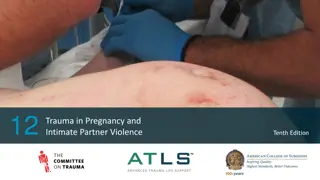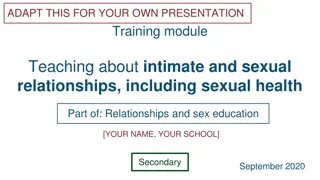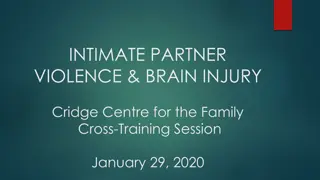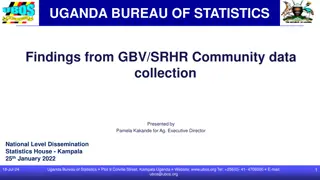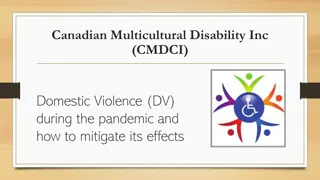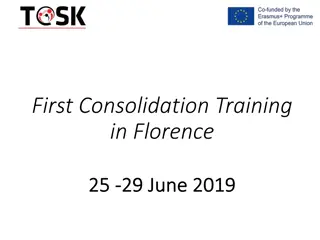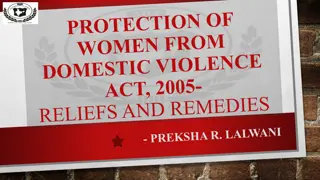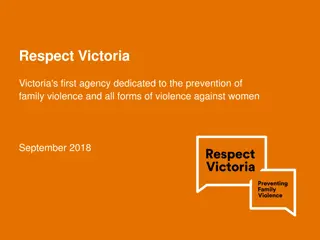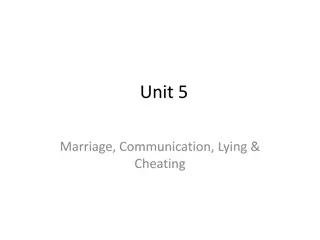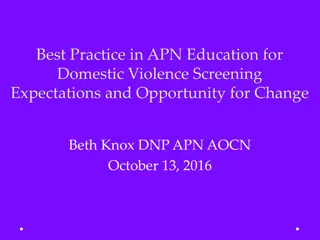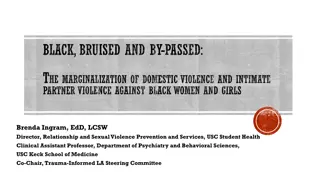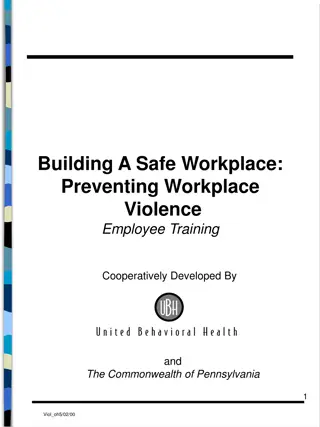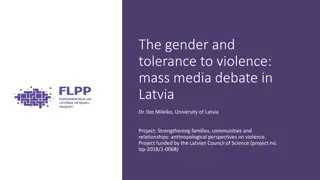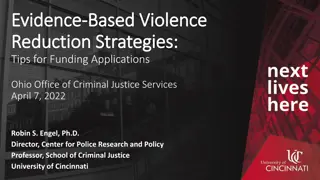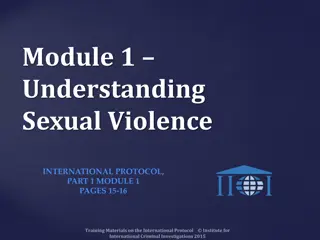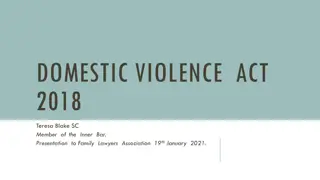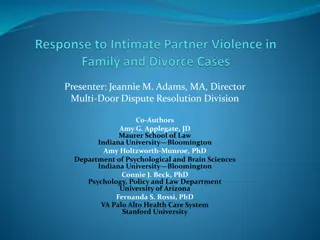Analyzing Intimate Partner Violence Policies in Belgium
This study examines the impact, processes, evolution, and public policies related to Intimate Partner Violence (IPV) in Belgium. It delves into the implementation of IPV policies through various instruments, discussing the methodology, collaborative tools, and societal implications. The analysis focuses on the dynamic translation process of policy instruments and the actors involved in shaping public action tools. The case study explores the role of instruments in addressing IPV and highlights the need for historic approaches to understand the emergence and development of policy tools.
Download Presentation

Please find below an Image/Link to download the presentation.
The content on the website is provided AS IS for your information and personal use only. It may not be sold, licensed, or shared on other websites without obtaining consent from the author.If you encounter any issues during the download, it is possible that the publisher has removed the file from their server.
You are allowed to download the files provided on this website for personal or commercial use, subject to the condition that they are used lawfully. All files are the property of their respective owners.
The content on the website is provided AS IS for your information and personal use only. It may not be sold, licensed, or shared on other websites without obtaining consent from the author.
E N D
Presentation Transcript
1 Intimate Partner Violence: impact, processes, evolution and related public policies in Belgium Analysing IPV policies through their instrumentation Aline Thiry et Catherine Fallon, Spiral ULi ge
Main steps : The approach : policy instruments Methodology : a Delphi survey with field actors Judiciarisation : the nul tolerance Collaborative instruments and information sharing
3 The instruments of public policy (Governing by instruments, Lascoumes & LeGales, 2007) Technologies of government are substantiated under the form of assemblage of diverse and heterogenous actors and resources (legal, administrative, professional, financial, etc). Instruments are technical : they have to fill specific functions, according to policy objectives Instruments are social : they carry a concrete concept of the politics/society relationship, as well as meanings and representations, supporting some behaviours and privileging some actors. An instrument organizes specific social & power relations Looking at "instruments at work" means analyzing their specific outputs and the power relations and forms of social control they organize through the materiality of public actions.
4 Analysis of instruments of public policy as dynamic translation process: Instruments are produced through a series of steps of translation coordinating heterogeneous actors : stabilizing associations producing representations, contributing to describe and categorize the social values and beliefs are mobilised through the social interactions; Conditions of emergence contribute to shape the instrument : an historic approach is necessary Analysing the development of instruments helps understand the patterns of transformation of a specific policy regime How is the problematisation of the stakes being defined ? What is at stake and what is ignored ? Design of public action tools results from a dynamic process to better link problematisation and actors. Reinterpretation means calling into question the "network actor" which are bearing a specific implementation instrument
5 Policy instrument: an example The Istanbul Convention is a policy instrument it bears a specific representation about the causality of the IPV with due attention to inequality of power position between men and women The Grevio reports are communication techniques define lines of intervention towards specific actors In Belgium the NGO s are supportive to this vision in the French speaking region but not in Flanders Who are the actors ? Who gets involved and who is ignored What is their representation about the social situation? About the problem? What values and beliefs are mobilized through the social interactions; What information and which model is mobilized ? Conditions of emergence contribute to shape the instrument : an historic approach is necessary
6 Delphi survey : Collecting data on problematisation dynamics and actors mobilisation The Delphi technique is iterative anonymous participatory technique: 1. Who participate ? experts as professionals and as experts of experience 2. Why iterative ? to organize a form of dialogue 3. Why anonymous ? to avoid domination and decrease social pressure Organized in 4 steps : 1. Understand the domain; identify the experts , exploratory interviews 2. Define the questions for the 1stround and leave room for surprises. 3. The Feedback loop : Feedback of the information gathered to the participants with the 2d round of questions (controlled feedback process): participants can react, comment, adjust their position, 4. The final report is fed back for consideration to respondents
7 Delphi Survey 2020-2021 The survey was sent to operators in the judiciary system, police, social intervention, administration. The experts invited had been identified as in charge of questions of violence against women. 219 actives respondants answered the questions from different sectors NL FR
8 Framing the issue of IPV : at federal level Historically the issue is closely linked to feminist NGO s. 1989 : possibility of rapes between partners in the penal code. 2001 : the issue is in the federal plan about addressing violence A key moment is 2006 : a policy discourse on Tolerance 0 at the level of the police and justice - How to define, identify and address IPV? - Increase intersectorial collaboration on the issue - The police must send all plainstif to the prosecutor and always ensure a follow up. A key moment is the pilot of Family Justice Centers in Flanders
9 Ensuring multi-frames with IPV : How to ensure coordination & collaboration between actors on the field : Police Justice Services and NGO s in the psycho-m dico-social sector Flanders : less independant organisations in the social sectors (CAW) Two experiences with family justice centers organising cooperation at the initiative of the prosecutor In Wallonia :there are many organisations : Feminist associations moblising a femimnist frame Other associations speaking of partners violence (to cover more situations)
Flanders and Wallonia : 2 social configurations Convention d Istanbul : pr venir / prot ger / poursuivre les violences (comme violences fond es sur le genre) National Action Plan : 2001 violences contre les femmes 2004 entre partenaires 2015 fond es sur le genre Federal Justice + police (Col 4/2006) : protect the victim and punish the author Interdisciplinary (Ketenaanpak) 2 active Familie Justice Centers Coordinated by the prosecutor No interdisciplinarity asbl asbl asbl asbl asbl asbl CAW: Symetric approach to IPV OCMW asbl asbl asbl CPAS ? Depolitisation of social work family wellbeing
11 The vision about Tolerance Zero : Even if it is still a reference in terms of police/justice intervention, it is not really applied in the field: great disparity in practices between judicial districts and police areas, also depending on the people who are handling the case. Are the expectations of the justice system exagerated? Critics point to problems at several levels: - The question of proof, which leads de facto to a re-characterisation of the criminal act. For example: the requirement of a medical certificate - the legal means : disposal number of legal tools that still have to be applied within a strict legal framework + lack of means at the disposal of the justice / police system + long (and slow) process - No victim protection measures take into account the long term
12 Some concluding points in recent years, new measures have been put in place which show a strengthening of the protective role of justice (temporary residence ban, chain approach, etc.) In Flanders, justice actors play a central role in the collaboration with the CAW and the police. In Wallonia, the associations refuse that the justice system takes this leading role. In the field, the framing influences the way the problem is handled There is no position of neutrality: the instruments are not neutral and it is the analyst's job to deconstruct the invisibility
13 Thank you for your attention! Aline.Thiry@uliege.be
One country, Two systems Convention d Istanbul : pr venir / prot ger / poursuivre les violences (comme violences fond es sur le genre) PAN (et IEFH) : 2001 violences contre les femmes 2004 entre partenaires 2015 fond es sur le genre Justice (Col 4/2006) : prot ger / punir les comportements punissables dans des rapports interpersonnels Interdisciplinary (Ketenaanpak) 2 active Familie Justice Centers No interdisciplinarity asbl asbl asbl asbl asbl asbl CAW OCMW asbl asbl asbl CPAS ?



